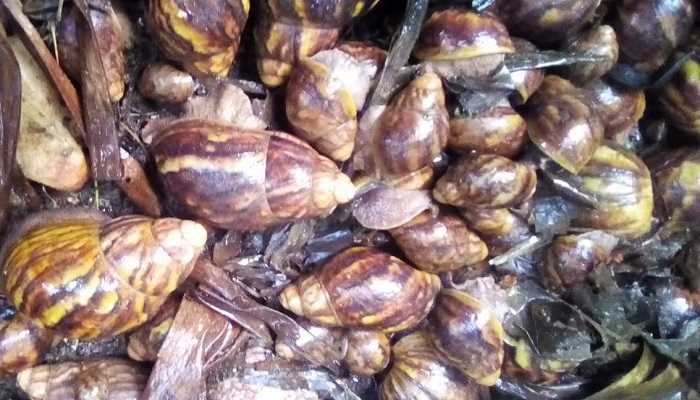Snail farming in Nigeria is a very lucrative business. Although the business has a slow yield, it provides a stable means of income. This is why lots of people don’t like venturing into it.
People love to make turnover as quickly as possible to maximize their profit. If you are a good businessman, you will definitely love this business; you will have only a few competitors.
Over to the snail, Land snails are always referred to as Congo meat in a lot of African countries. It belongs to the class of Mollusca, known as Gastropods.
You can do further research on the terms, Wikipedia will tell you more.
There are different species of snails, but not all of them are suitable for commercial farming in Nigeria.
The most significant nutrient in the rearing of snail is Calcium. Your snail needs an adequate supply of calcium to be able to do well.
A low intake of calcium will slow down the growth rate of your snails – because calcium is required by the snails to form their shells. This would usually result in a thin shell.
The good news is that food source that supply calcium is not difficult to get. Your snails can get it from the green outer leaves of cabbage, which you can easily obtain from any Nigerian fruit and vegetable market.
Snail Feed
A snail farmer provides food supply to the snail except in a very extensive snail farm. Depending on the type of farming established, the farmer either part or all the food requirements of the snail.
You can do this by either cultivating or buying snail food. Thus, the knowledge of what snail needs for proper growth and development is highly essential.
Juvenile snails thrive better with juicer feed sources, whereas adult snails can be fed with stronger feeds and occasionally feed on soil substrate to get a sufficient amount of calcium they need for proper development.
Snail feeding is not much difficult. The feed for rearing snail can be gotten from roughly every non-toxic organic without hair or wax, like leaves, fruits, vegetables, tubers, and household wastes that have no trace of salt.
The most commonly used feed for snails is banana, melon, cabbage, carrot, pawpaw, lettuce, cucumber, potato, pumpkin, plantain, and so on.
A few farmers produce special types of feeds for snails. It is all left for you to decide the type of feed to use, but you must consider the cost and the profit margin you hope to make.
Personally, to me, there is absolutely no need to buy snail feed when you can easily get natural and cheaper sources of feed to rear your snail.
Suitable Species for Snail Farming
A medium-sized to very large snail genus known as Achatina in the form of snail that is mostly reared.
This snail is commonly the air-breathing, tropical land, and terrestrial snails. There are roughly two hundred species of Achatinidae in Sub-Saharan Africa.
The species that are mostly farmed are Achatina achatina Linnaeus, Achatina marginata, and Achatina Fulica.
Breeder snails are the female and male snail breeders; you need to start a snail farm.
1. Achatina Fulica
This is the East African land snail or giant African land snail. It is an air-breathing land snail that thrives in a terrestrial environment. It belongs to the family of Achatinidae.
It is the smallest of all forms of snail that are suitable for farming in Nigeria with a narrow, conical shell.
It is two times longer than the width and has a reddish-brown colour with yellow frail vertical markings. The most common type has a light coffee colour.
2. Achatina Achatina
Achatina Achatina is commonly known as the giant Ghana snail or the giant tiger land snail. It is as well air-breathing as a land snail.
It is a giant hermaphrodite African land snail. This means that it has both female and male reproductive organs.
3. Archachatina Marginata
This is commonly known as the giant West African snail. It is the snail species mostly used for snail farming because it is very big and the biggest snail species globally. It also has the highest yield.
Step to Start Snail Farming.
Before starting snail production, these are the things you have to put into consideration.
1. Be sure you want to venture into snail farming.
Why most people fail in business is not because they lack knowledge in the business they do, but because they don’t have passion for the business.
Research has shown that over 82% of collapsed businesses are inherited, or the owner had no passion for it.
If you know that you can’t boldly tell people that you are a snail farmer, then I will advise that you don’t even start at all.
When people work in the bank, they are proud to tell everyone that they are bankers, the same goes for other white-collar jobs.
But most farmers chose to hide their profession and what they do.
For the Christian, in the Bible, God said that he would bless the works of your hands, how do you expect to get those blessings if you don’t like the work that you do.
2. Capital matters a lot
By capital, we mean the total sum of resources or money needed to establish a business.
Before you kick start a snail farming business, you must first calculate the resources you are willing to put into the business, and how to access such funds.
It is your capital that will determine how big or the kind of snail farming you will establish.
3. Go for a market survey
You don’t just start up a business without knowing the market of your produce. You are expected to do research to know the viability of your business in your location, who your potential buyers are, as well as your competitors.
Imagine starting up a snail farm in a place where people don’t like snail meat, or in a place where there are already lots of snail farms. Such may have a negative impact on your sales. So all these factors have to be put into consideration.
4. Make an investigative study
Here you will have to visit at least two snail farms, find out how they operate, the challenges. The cause of the investigation is also there to find out their challenges.
This point is very necessary, never start snail farming just with the information you have gathered online, you have to see a farm by yourself.
5. Hire the services of an expert
In the beginning, if you don’t have any experience, it is best to hire some that do. The person will help you set up your snail farm to your standard. And supervise the farm for at least a month, then you can take it from there after you must have learned at the necessary thing needed to be learned.
6. Sales techniques
Don’t wait for customers to come to you to go and search for customers. Go to hotels, restaurants, and market women and speak to them. Tell them that you can supply them snail meat when every they need it.
Snail Farming Pests And Diseases
You should build your farm in such a way that snakes, lizards, ants, chickens, and termites can not gain access to.
There are not many diseases identified in the snail, but bacteria and fungus diseases that are spread easily by contact have been noticed in the overcrowded pens.
During the dry season, it will be needed to always irrigate the snail farm, or else the snail will hibernate. If there is drought, a snail can spend two years in hibernation, in the case of desert snails.
Advantages of Snail Farming in Nigeria
If you choose to invest in snail farming, the benefits of choosing snail farming are listed below.
- Snails are naturally hermaphroditic and have a high level of reproduction. Every snail has both Male and female reproductive organs. This makes it reproduce very fast.
- A healthy snail can lay eggs as much as six times in just a year. For each of their laying, they lay about eighty to a hundred eggs, sometimes even more.
- Research has shown that snail meat is much better than the common red meat in terms of nutritional value.
- The meat is high in protein, calcium, iron, and phosphorus. It is very low in cholesterol, fat, and sodium.
- Due to the nutritional benefits, dietitians and doctors highly recommend snail meat to people.
- The meat of a snail is so delicious, and it is widely accepted by almost the entire population of Nigeria.
- For love people have for the snail meet, it made it very large here in Nigeria, in most West African countries, and even across the African continent.
- The main tasks involved in the snail farming business are first, financing (capital) production, processing, servicing transporting, sorting, and marketing.
- If you choose to do domestic snail farming, it should be enough to meet your family’s nutrition demands.
- Large-scale snail production for commercial purposes will strengthen the country’s GDP by creating employment and reducing to rate at which frozen foods are imported as a substitute.
- The level of involved risk in snail farming is very low when compared to most other livestock farming.
- All the body parts of the snail are very useful. Those that venture into snail production end up having little or no waste, unlike most other livestock. This is because every part of the snail’s body is usable for one thing or the other.
- Getting involved in snail production or snail farming won’t consume your time; it doesn’t require much stress, and you can actually combine it with your normal day job. It is also odorless and noise-free.
- Much space is not needed to start up snail farming. It’s something you can do in your backyard and expand with time.


